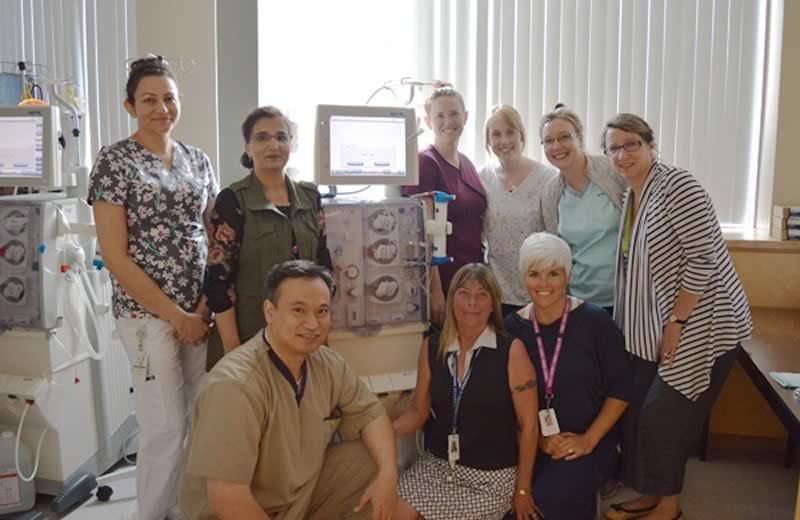Collaboration and dedication of health care practitioners
On July 8, 2017 the hemodialysis unit at the University Hospital of Northern BC (UHNBC) in Prince George received a call from the charge nurse at Cariboo Memorial Hospital in Williams Lake. The town had been placed on evacuation alert due to the wildfires, and they may need to transfer 18 patients to Prince George. That call started a sequence of events which brought together two hemodialysis units from different health authorities and showcased the collaboration and dedication of health care practitioners.
Later on July 8, Iqwinder Mangat, the head nurse for hemodialysis, spoke with a director at Interior Health where she learned that transferring the patients to Prince George was plan B, and Kamloops was their plan A. A teleconference at 6:30 pm on July 9 confirmed that they were proceeding with plan B and 18 hemodialysis patients were being evacuated to Prince George. An evacuate order for Williams Lake was imminent and they needed to evacuate patients as soon as possible.
By the time Mangat got off the teleconference call, the hemodialysis unit at UHNBC was already closed. She came in to the unit to look at the patient schedule for the next day to free up spots for the Williams Lake patients. A renal tech also came in to assist with moving dialysis supplies to prepare for the additional patients. The next morning, Mangat received calls from the Williams Lake patients to schedule their dialysis treatments, and they were slotted into available spots. Their quick thinking and planning made it so all scheduled patient treatments could carry on as normal.
The hemodialysis unit at UHNBC welcomed staff deployed from the Cariboo Memorial Hospital hemodialysis unit to work with them on the unit. Due to the difference in dialysis machines used in the two hospitals, they first had to undergo training on the machines. Once the Williams Lake nurses were comfortable using the machines, one UHNBC nurse was paired with them to help troubleshoot and support the Williams Lake staff.
By moving UHNBC patients into the main room and moving overflow patients to the Parkwood Independent Dialysis Unit, they set up a small dialysis unit within the hemodialysis unit operating five chairs from 7 am to 7 pm to support the Williams Lake patients. Accompanied by one UHNBC nurse, the nurses from Williams Lake staffed the unit, allowing them to work with patients they were familiar with. It was a welcome sight for both staff and patients and brought back a sense of normalcy in such a stressful time.
The entire team worked together to ensure patients were being cared for
The entire team worked together collaboratively and offered support and assistance where they could. Managers took on administrative duties, emergency operation centre meetings, and HR tasks usually designated to clinical practice leads or head nurses. Nursing unit clerks were shared between the kidney clinic and hemodialysis unit, and staff were more than willing to work extra shifts when needed to ensure patients were receiving treatments.
Numerous staff and physicians brought in food, cards, flowers, and treats to thank everyone for their contributions and make the Williams Lake nurses feel welcome and part of the team. Staff’s extra support and dedication helped to make the hemodialysis unit function effectively despite the additional patients and pressures. They were willing to cancel vacation, work overtime, assist other facilitates, and work together in any way they could.
One telephone call changed the entire course of the 2017 summer for the hemodialysis staff, managers, and physicians. They welcomed 18 additional patients, and new staff all within a matter of days with no disruption to services. It demonstrated the strength of their resolve and showcased their collaborative nature, and was an experience that left a lasting impression on everyone involved.














Comments